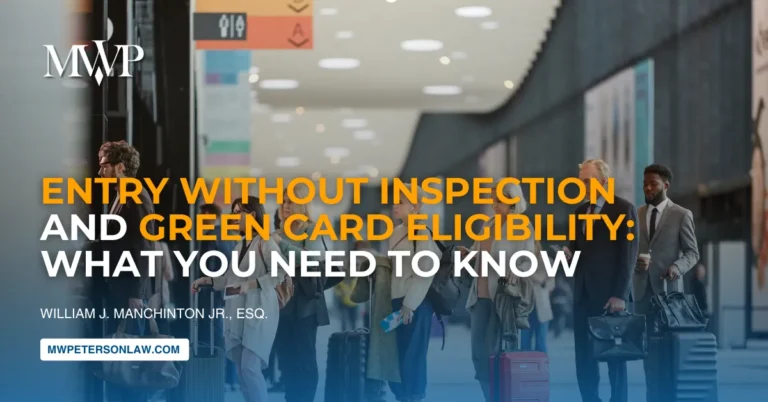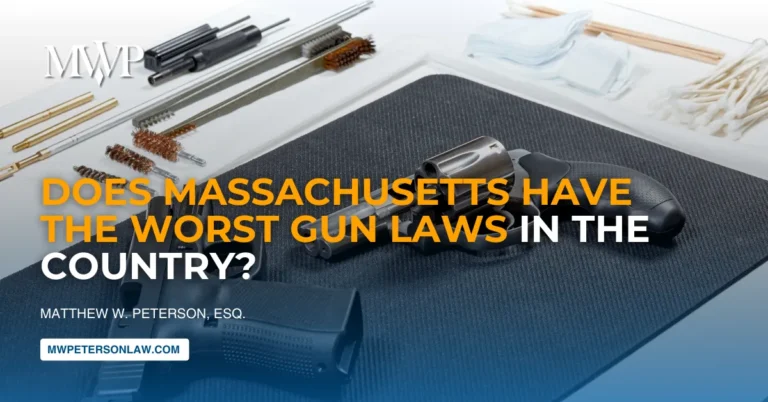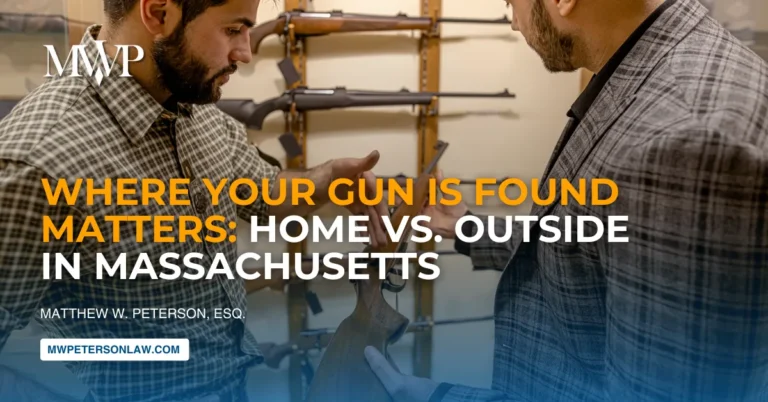Rights To Police Misconduct Evidence
If you’re facing criminal charges in Massachusetts, two groundbreaking decisions from the Massachusetts Supreme Judicial Court in 2024 have dramatically strengthened your rights to evidence about police misconduct. These cases – Graham v. District Attorney for the Hampden District1 and Commonwealth v. McFarlane2 – establish powerful new protections that could make the difference between conviction and acquittal. Facing criminal charges in Massachusetts is hard and you need a legal representation to fight for your rights. Here at the Law Office of Matthew W. Peterson, we always fight and defend for your rights.
Why These Cases Matter For Your Defense
For decades, prosecutors have held the cards when it comes to evidence about police officer credibility. Too often, defense attorneys learned about officer misconduct only after convictions, if at all. These two decisions change the game by forcing prosecutors to actively investigate police misconduct and clarify exactly what they must disclose – and when.
The stakes couldn’t be higher. When a police officer testifies against you, their credibility often determines whether a jury believes your version of events or theirs. Evidence that an officer has lied before, used excessive force, or been found liable for violating someone’s rights can completely change how a jury views their testimony. These cases ensure you get that evidence when it exists.
The Springfield Scandal That Sparked Change
The Graham case arose from shocking revelations about the Springfield Police Department. In July 2020, the U.S. Department of Justice released findings from a 27-month investigation revealing that Springfield police officers, particularly in the Narcotics Bureau, routinely violated citizens’ constitutional rights.
Federal investigators found officers “repeatedly punch individuals in the face unnecessarily,” falsified police reports, and faced no accountability despite clear patterns of abuse.
The DOJ documented disturbing specifics: 19% of prisoner injuries between 2013-2019 were caused by punches to the head. In one case, an officer kicked a handcuffed Hispanic juvenile in the face. Another officer punched a 17-year-old riding past on a motorbike. Despite ample evidence, not a single excessive force complaint was sustained against narcotics officers in six years.
When criminal defendants sought evidence about this misconduct for their cases, the Hampden County District Attorney’s Office refused comprehensive disclosure. Six plaintiffs, including defense organizations and individuals convicted based on testimony from these officers, petitioned the Supreme Judicial Court for relief.
The Court's Response: Prosecutors Must Investigate And Disclose
- First, the DA’s office disclosed adverse credibility findings about officers only on a “discretionary basis” – picking and choosing what to reveal rather than following clear standards.
- Second, they withheld evidence of misconduct when they couldn’t attribute specific bad acts to particular officers, even though such evidence could still undermine the credibility of the unit as a whole.
- Third, they failed to obtain documents the DOJ had reviewed during its investigation.
McFarlane Clarifies: When pending Lawsuits Matter
New Disclosure Requirements Under Rule 14
- The “prosecution team“ now explicitly includes all police officers involved in investigating or prosecuting your case. If there’s doubt whether an officer is part of the team, “it will likely be resolved in favor of disclosure.“
- The rule requires disclosure of all “items and information favorable to the defense“ – broader language than the previous “exculpatory evidence” standard.
- Critically, Rule 14(a)(2) codifies the prosecutor’s duty to “inform, inquire, collect, disclose, preserve, notify, and record information.” This isn’t passive – prosecutors must actively seek out potentially helpful evidence, including asking officers about misconduct findings.
What Prosecutors Must Now Do
- They must investigate when credible evidence suggests systematic police misconduct. After the DOJ report on Springfield police, for example, prosecutors couldn’t simply wait for defense requests – they had to proactively determine which cases might be affected.
- They must maintain and check “Brady lists” of officers with credibility issues. At least three Massachusetts district attorneys already maintain such lists, with Middlesex County tracking over 100 officers and Norfolk County listing 38.
- They must disclose sustained findings including internal affairs findings against officers, civil liability judgments, criminal convictions affecting credibility, and evidence of false statements or reports. The duty extends to both work-related and non-work-related misconduct (except expunged records).
- They must inquire regularly – prosecutors can’t claim ignorance about officer misconduct. They must ask officers and check available databases for disqualifying information.
What This Means For Your Defense
- Automatic disclosure means you don’t need to know what to ask for – prosecutors must turn over police credibility evidence without any request from your attorney. This levels the playing field, especially for defendants with limited resources.
- Continuing obligations mean that if new evidence of officer misconduct emerges during your case, prosecutors must immediately disclose it. This protection extends through trial and even to post-conviction proceedings.
- Remedies for violations can include new trials, dismissal of charges in egregious cases, or exclusion of tainted evidence. Courts will examine all withheld evidence collectively to determine if disclosure would have changed the outcome.
Red Flags To Watch For
- If your arresting officer works in a unit under federal investigation or consent decree, comprehensive disclosure about unit-wide problems may be required. When officers from multiple agencies are involved, each agency’s misconduct records must be checked.
- If your case involves common “cover charges” like resisting arrest or assault on a police officer, courts recognize these charges are sometimes used to justify excessive force.
The Difference Between Pending Lawsuits And Proven Misconduct
Your Attorney's Role In Enforcing These Rights
Looking Forward: A New Era of Police Accountability
Conclusion: Know Your Rights And Demand Them
Remember:
- Under Graham, prosecutors can’t wait passively for misconduct evidence to surface.
- Under McFarlane, they must disclose proven misconduct, not just rumors.
- Under new Rule 14, they must actively inquire about officers’ credibility issues. These aren’t just legal technicalities – they’re essential protections ensuring you receive a fair trial based on the whole truth, not just the parts that help the prosecution.
Bibliography
- Brady v. Maryland, 373 U.S. 83 (1963).
- Commonwealth v. Beal, 429 Mass. 530 (1999).
- Commonwealth v. Correia, 492 Mass. 220 (2023).
- Commonwealth v. Cotto, 471 Mass. 97 (2015).
- Commonwealth v. Frith, 458 Mass. 434 (2010).
- Commonwealth v. Martin, 427 Mass. 816 (1998).
- Commonwealth v. McFarlane, 493 Mass. 385 (2024).
- Commonwealth v. Sullivan, 478 Mass. 369 (2017).
- Commonwealth v. Ware, 471 Mass. 85 (2015).
- Giglio v. United States, 405 U.S. 150 (1972).
- Graham v. District Attorney for the Hampden District, 493 Mass. 348 (2024).
- Kyles v. Whitley, 514 U.S. 419 (1995).
- Matter of a Grand Jury Investigation, 485 Mass. 641 (2020).
- Planned Parenthood League of Mass., Inc. v. Bell, 424 Mass. 573 (1997).
Rules and Statutes:
Government Documents:











